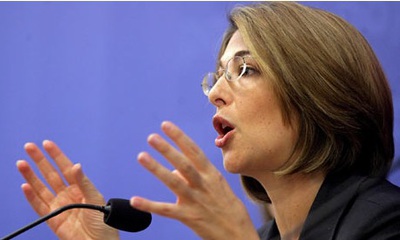|
|
A Review of This Changes Everything: Capitalism vs. The Climate
un articulo por Kim Scipes, Znet
Naomi Klein has once again mobilized her
impressive journalistic and writing skills, this time
to address the issue of climate change in her new
book, This Changes Everything: Capitalism vs.
The Climate. The timing of her new book is
precipitous, coming out in the same month as the
Global Climate March in New York City, and 2700
demonstrations worldwide the same day. It should
be seen as another important arrow to be added
to the quiver of the global movement for life. 
Naomi Klein, Photograph: Pawe Kula/EPA
click on photo to enlarge
Klein’s clarity is striking, as is her ability to cut
through the nonsense and obfuscation of not only
the mass media, but of those of corporate and
governmental “leaders” who are in the process of
killing the atmosphere (or those denying it is being
murdered), and thus, each of us. She reports that
a nonbinding agreement signed in Copenhagen by
the major polluting countries to keep the rise in
the Earth’s temperature below 2 degrees Celsius
is a joke: “[greenhouse gas] emissions are rising
so rapidly that unless something radical happens
within our economic structure, 2 degrees now
looks like a utopian dream.”
[Note: a 2 degree Celsius temperature increase in
the Earth’s average temperature from that of the
year 1750—the beginning of the industrial
revolution—has been long seen as the most the
planet can tolerate before we start having major
negative ramifications in natural systems that
sustain human and animal life as well as that of
many plants; 2 degrees today is generally seen by
climatologists and other earth scientists as an
increasingly inadequate standard, being too high.]
Klein reports that even the World Bank recognizes
we’re on the track for a 4 degree warmer world—
by the end of this century—and then quotes Kevin
Anderson of the UK’s Tyndall Centre for Climate
Change Research: “a 4 degrees Celsius warming
—7.2 degrees Fahrenheit—is ‘incompatible with
any reasonable characterization of an organized,
equitable and civilized global community’.”
With this knowledge, why haven’t the peoples of
the world mobilized to curtain greenhouse gas
emissions? “I think the answer is far more simple
than many have led us to believe: we have not
done the things that are necessary to lower
emissions because these things fundamentally
conflict with deregulated capitalism…”; “the
actions that would give us the best chance of
averting catastrophe—and would benefit the vast
majority—are extremely threatening to an elite
minority that has a stranglehold over our
economy, our political process, and most of our
media outlets.”
(Thank you to Janet Hudgins, the CPNN reporter
for this article.)
(This article is continued in the discussionboard)
|








|
DISCUSSION
No hay pregunta ligada a este article.
* * * * *
Comentario más reciente:
(The following is continued from the main article listed above.)
Klein proceeds to detail what’s going on, writing a (brilliant) chapter on the climate change deniers, especially the Chicago-based Heartland Institute. But she doesn't let the liberal-left off the hook, either: “So here’s my inconvenient truth: I think these hard-core ideologues understand the real significance of climate change better than most of the ‘warmists’ in the political center, the ones who are still insisting that the response can be gradual and painless and that we don’t need to go to war with anybody, including the fossil fuel companies.” Further, “[t]he deniers get plenty of the details wrong … but when it comes to the scope and depth of change required to avert catastrophe, they are right on the money.”
Ultimately, Klein recognizes that we need to challenge the very cultural worldview of those killing the planet: “What the climate needs to avoid collapse is a contraction in humanity’s use of resources; what our economic model demands to avoid collapse is unfettered expansion. Only one of these sets of rules can be changed, and it’s not the laws of nature.”
Klein spends the rest of the book strongly supporting her case. She debunks myths, such as that some “enlightened” capitalist, such as Richard Branson, will save us, or that a technological “fix” will do the trick. (Unfortunately, she missed Bon Joon Ho’s recent movie, “Snowpiercer,” which shows if we don’t get changes right, the result will be chaos.) She eviscerates the idea that fracking is safe, pointing out its extensive release of methane, which is even more harmful to the atmosphere than carbon dioxide. Her arguments are bold, cogent and to the point. She’s not willing to let people off the hook, and criticizes “magical thinking.”
The third part of her book—the part that focuses on those fighting back as well as those fighting for change—is inspirational.
This is the section that gives hope; the realization that those joining the struggle today do not have to start from scratch, but with the knowledge there is a global movement for social and environmental justice. Klein reports from places such as Rumania, Greece, Latin America as well as Native American reservations, and the increasing development of cross-sectoral alliances such as “Cowboys and Indians” on the North American plains.
In this section, she draws attention to something I believe is extremely important: it used to be the extraction industries (mining, oil and gas, etc.) could get their way by limiting the impact to those who were dependent on that industry, especially for jobs. . ... continuación.

|
|









